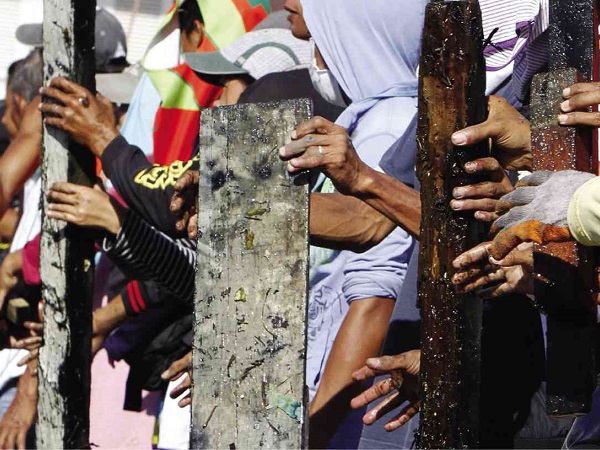Tacloban teems with signs of struggle to rise

TACLOBAN City residents take part in a cash-for-work program of the Tzu Chi Foundation that not only gives them P500 each per day but also helps them get back on their feet with their dignity intact. RAFFY LERMA
TACLOBAN CITY—Vehicles fought for space on streets that are being cleared of debris by an army of volunteers wielding brooms, spades and rakes.
The clearest sign that this city is struggling to get back on its feet are survivors of Supertyphoon “Yolanda” refusing to just wait for aid.
Conrado Altugar, 56, of Barangay (village) 100, is one of hundreds of people mobilized by Taiwanese Buddhist Tzu Chi Foundation, one of several foreign humanitarian groups that see the greater need for this city’s people to regain their dignity through hard work instead of just relying on dole outs.
Altugar is typical of many residents of the city who had found help, not in the form of bags of canned goods or rice that the hungry line up for in distribution centers, but through work.
He reports to the Tzu Chi Foundation at 8 a.m. to help clean the city streets of debris left by Yolanda and calls it a day at 4 p.m. He, and the hundreds of others who found work through Tzu Chi, are paid P500 a day.
Beneficiaries of the cash-for-work program of Tzu Chi are divided into 10 teams with 10 people in each team.
Social Welfare Secretary Corazon Soliman, in an interview on Monday, said cash-for-work programs boost survivors’ morale and help them live normal lives.
A check made by the Inquirer with city hall officials, however, showed that, except for Tzu Chi’s, there is no other cash-for-work program in place in the city.
Carmela D. Bastes, city social worker, said the city government is still drafting a plan for the cash-for-work program.
Priority areas for this program, she said, are those along the coasts.
Soliman said the distribution of relief is continuing. The government, she said, has distributed 1.5 million packs—each pack containing eight canned goods, 6 kg of rice and a tent—in Eastern Visayas.
DSWD records said as of Monday, the food packs had been distributed in three cities—Tacloban, Ormoc and Baybay—and 40 towns in Leyte and 14 towns in Eastern Samar, Western Samar and Biliran.
“Obviously, the feeling of desperation is now waning,” said Soliman. “They are now starting to think of things other than where to get their food but how to rebuild their homes,” she said.
She said as of Monday, many businesses have opened in the city—four grocery stores, four restaurants, two water refilling stations, nine banks, six gas stations and five hardware stores.
Three vulcanizing and auto repair shops have opened as well as a courier and remittance service outlet.
Four radio stations are back on the air while transport operators are starting to return to business.














